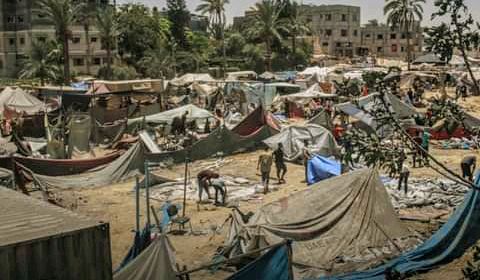The United Kingdom, France, Germany and Italy, have strongly supported the ongoing mediation efforts by the United States, Egypt and Qatar to conclude the agreement for a ceasefire, the release of hostages and are encouraged by the constructive approach adopted so far.
In a joint statement released by the Foreign Ministers of this four nations recently, urging all parties to continue to engage positively and flexibly in this process while underlined importance of avoiding any escalatory action in the region which would undermine the prospect for peace as too much at stake.
These Nations also welcomed the fact that technical work will continue over the coming days, including on both the humanitarian provisions and the specific arrangements relating to hostages and detainees, and that senior officials will then reconvene before the end of next week with the aim of concluding the agreement. Ahead of truce talks in Qatar last Thursday and Friday, it was reported that Hamas had called on mediators – rather than holding more negotiations – to implement a framework outlined in late May by US President Joe Biden.
Ahead of truce talks in Qatar last Thursday and Friday, it was reported that Hamas had called on mediators – rather than holding more negotiations – to implement a framework outlined in late May by US President Joe Biden.
Mr Biden said yesterday that a ceasefire was “still possible” and that the United States was “not giving up” in brief comments to reporters.
After the Qatar talks between US, Egyptian and Qatari mediators, the United States submitted a new compromise proposal, leading Hamas to yesterday accuse Mr Netanyahu of obstruction.
According to Hamas, the proposal “responds to Netanyahu’s conditions, especially his rejection of a permanent ceasefire and a comprehensive withdrawal from the Gaza Strip, and his insistence on continuing to occupy the Netzarim junction, the Rafah crossing and the Philadelphi corridor”.
The latter two places are seen by Israel as important for preventing the flow of any weapons into Gaza, while the Netzarim junction sits at a strategic point between northern and southern Gaza.
Mr Netanyahu was “fully responsible for thwarting the efforts of the mediators, obstructing an agreement, and (bears) full responsibility for the lives” of hostages in Gaza, the Islamist movement said in a statement. The plan announced by Mr Biden at the end of May would freeze fighting for an initial six weeks as Israeli hostages are exchanged for Palestinian prisoners in Israeli jails and humanitarian aid enters besieged Gaza.
The plan announced by Mr Biden at the end of May would freeze fighting for an initial six weeks as Israeli hostages are exchanged for Palestinian prisoners in Israeli jails and humanitarian aid enters besieged Gaza.
Mr Netanyahu’s office on Saturday in a statement said Israeli negotiators have expressed “cautious optimism” about reaching a Gaza truce deal.
US, Qatari and Egyptian mediators also reported progress. Months of on-off truce negotiations have taken place, so far without any agreement.
But the stakes have risen since the late July killings of Iran-backed militant leaders, including Hamas political chief Ismail Haniyeh, and as the humanitarian crisis in Gaza deepened with a feared polio outbreak.
As efforts towards a long-sought truce continued, so did the violence in Gaza, but also in the Israeli-occupied West Bank and in Lebanon, where Israeli forces and Hamas’s Iran-backed ally Hezbollah have traded near-daily fire throughout the war.
Civil defence rescuers in Hamas-run Gaza reported a total of 11 people killed in Israeli bombardment of Deir el-Balah and in air strikes on Jabalia refugee camp recently.
The latest killings have pushed to 40,099 the death toll from Gaza’s health ministry, which does not give details of civilian and militant deaths, according to report.
Hamas’s 7 October attack on Israel that started the war resulted in the deaths of 1,198 people, mostly civilians, according to an AFP tally of Israeli official figures.
The Israeli military said troops continued operations in central and southern Gaza and “eliminated” militants in Rafah, on the territory’s border with Egypt.
From the Israeli-designated safe zone in southern Gaza’s Al-Mawasi, a fearful Lina Saleha, 44, said she could hear “constant artillery shelling” and the rumble of tanks “getting closer.”
Iran and its regional allies have vowed retaliation for Haniyeh’s death in Tehran – which Israel has not claimed responsibility for – and for an Israeli strike in Beirut that killed a top Hezbollah commander.
US officials have indirectly heard that Iran “want to see a ceasefire, they don’t want to see regional escalation”, the US official said.
Out of 251 hostages seized during Hamas’s attack, 111 are still held in Gaza, including 39 the military have said are dead. More than 100 were freed during a one-week truce in November.












